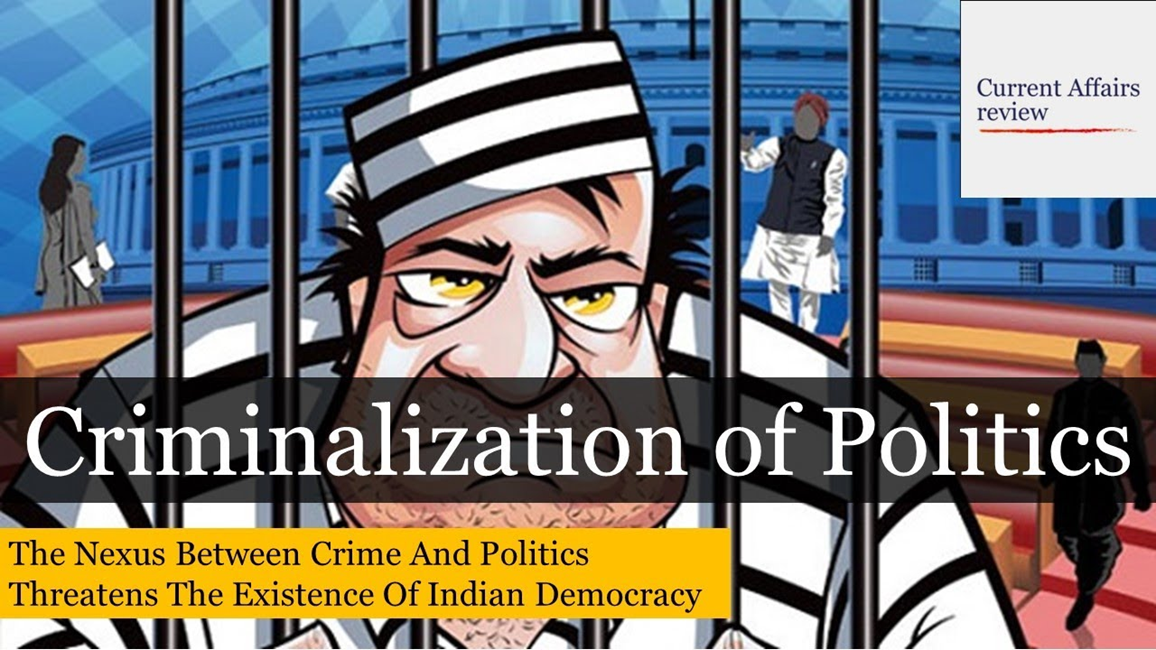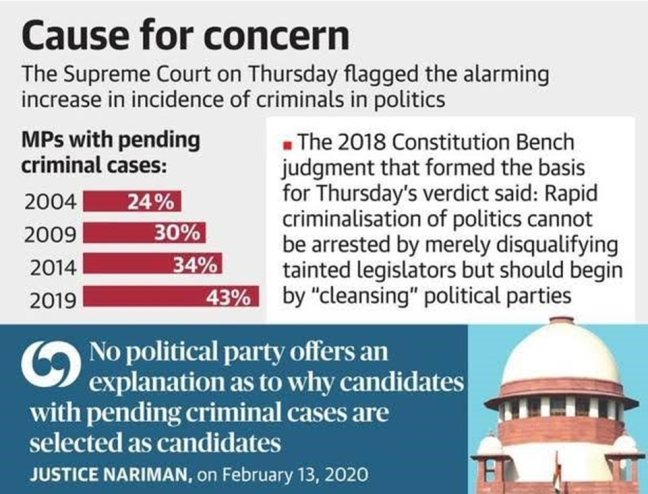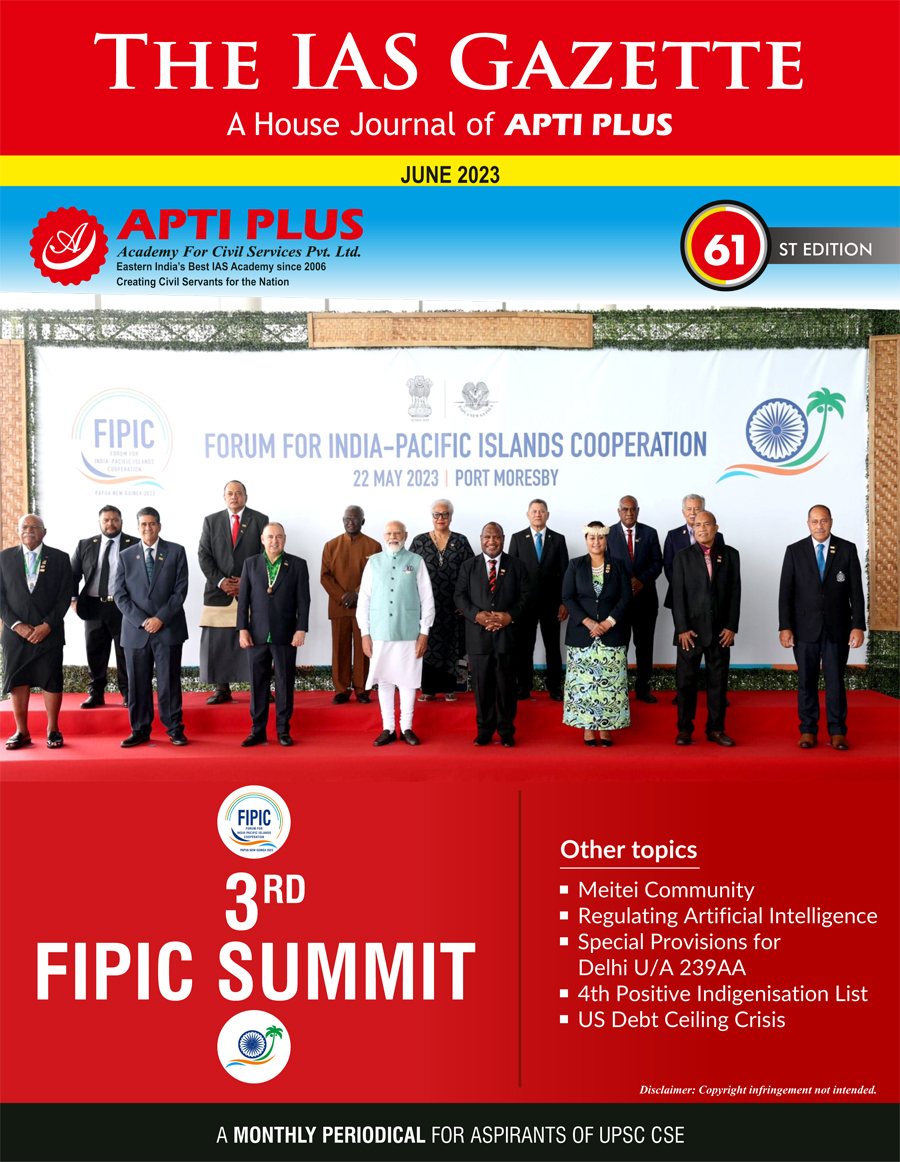
Copyright infringement not intended
Context: The Association for Democratic Reforms (ADR) filed a petition before the Election Commission of India (ECI) urging it to take strict action against political parties that nominate candidates with criminal backgrounds. ADR argued that such candidates pose a serious threat to the rule of law and public morality, and undermine the credibility of the electoral process.
Details
- The Association for Democratic Reforms (ADR) is a non-governmental organisation that works towards improving governance and strengthening democracy in India. One of its key objectives is to curb the influence of money and muscle power in elections and politics.
- According to ADR's analysis of the affidavits filed by candidates in the 2019 Lok Sabha elections, 43% of the MPs who won had pending criminal cases against them.
- ADR also pointed out that political parties have been ignoring the directions of the Supreme Court, which in 2018 had asked them to publicise the criminal antecedents of their candidates and explain why they chose them over others. ADR claimed that most parties either did not comply with these directions or did so in a perfunctory manner.
- ADR's petition sought the ECI to invoke its powers under Article 324 of the Constitution and Section 29A of the Representation of the People Act, 1951, to derecognise or de-register political parties that fail to prevent the criminalisation of politics. It requested the ECI to issue guidelines for political parties to ensure transparency and accountability in candidate selection.
- ADR's petition is a timely and important intervention in the ongoing debate on how to cleanse Indian politics of criminal elements. It highlights the need for greater vigilance and action by both the ECI and the citizens to safeguard democracy and uphold constitutional values.
|
Election Commission of India
●The Election Commission of India (ECI) is an autonomous constitutional body responsible for conducting free and fair elections in India.
●The ECI was established on January 25, 1950, under Article 324 of the Indian Constitution. The ECI consists of a Chief Election Commissioner (CEC) and two Election Commissioners (ECs), appointed by the President of India for a term of six years or until they attain the age of 65 years, whichever is earlier.
●It has the power to supervise, direct and control the entire process of elections to the Parliament, the State Legislatures, the offices of the President and the Vice-President, and the local bodies.
●It has the authority to issue directions and guidelines to ensure that the elections are conducted in a free, fair and impartial manner. It can also take disciplinary action against any person or party for violating the election laws or the model code of conduct.
●It is independent of the executive, legislative and judicial branches of the government. The ECI cannot be removed from office except by impeachment by the Parliament on the grounds of proven misbehaviour or incapacity.
●It enjoys financial autonomy and can draw funds directly from the Consolidated Fund of India.
|
Criminalization of Indian Politics
About
- India is often hailed as the world's largest democracy, with a vibrant and diverse political system that reflects the aspirations of its 1.3 billion people. However, this system is also plagued by a serious problem “the criminalization of politics”.
- Criminalization of politics means the involvement of people with criminal records or charges in the political arena. It is a serious threat to the democracy and rule of law in India.
Backgrounds
- The problem of criminalization of politics is not new in India. It has its roots in the colonial era when some freedom fighters resorted to violent means to oppose British rule.
- After independence, some of these groups continued to use violence and crime as a tool to gain political power and influence. They formed alliances with political parties and contested elections, often using money and muscle power to win votes.
- According to the Association for Democratic Reforms (ADR), a non-governmental organization that works on electoral reforms, out of the 543 members of parliament (MPs) elected in the 2019 Lok Sabha elections, 233 (43%) had criminal cases pending against them, of which 159 (29%) had serious criminal cases such as murder, rape, kidnapping, etc. The percentage of MPs with criminal cases has increased from 24% in 2004 to 43% in 2019.

Reasons for the criminalization of politics
Lack of effective laws and enforcement
- The existing laws and institutions to prevent and punish the involvement of criminals in politics are weak and ineffective.
- For example, the Representation of the People Act, 1951, which regulates the conduct of elections in India, only disqualifies a person from contesting elections if he or she is convicted of certain offences and sentenced to imprisonment for more than two years. However, this does not apply to those who are accused or charged with crimes but not convicted.
- The judicial process is often slow and delayed, allowing many criminals to evade conviction and continue their political careers.
Demand for strong leaders
- Many voters prefer candidates who can provide them with security, development and welfare benefits, regardless of their criminal background. They perceive criminals as strong leaders who can protect them from external threats and internal conflicts, such as communal violence, caste discrimination, etc. They also expect them to deliver public goods and services, such as roads, electricity, water, etc., by using their influence and resources.
Supply of money and muscle power
- Many political parties rely on candidates with criminal records or charges to fund their election campaigns and mobilize voters. They consider them as winnable candidates who can attract votes from their caste, community or region. They also use them to intimidate or coerce their opponents and supporters.

Negative Impacts on Democracy and Society
Erosion of public trust and Legitimacy
- The involvement of criminals in politics undermines the credibility and integrity of the political system and institutions. It erodes the public trust and confidence in the elected representatives and the government.
- It also creates a sense of cynicism and apathy among the citizens, who feel that their votes do not matter or make a difference.
Violation of human rights and rule of law
- The presence of criminals in politics leads to the violation of human rights and the rule of law in the country. It encourages a culture of violence, corruption and impunity in society.
- It also affects the independence and impartiality of the judiciary, police and other agencies that are responsible for ensuring justice and accountability.
Hindrance to development and governance
- The participation of criminals in politics hampers the development and governance of the country. It affects the quality and efficiency of public policies and programs that are meant to address the socioeconomic problems and challenges faced by the people. It also diverts public resources and funds from productive sectors to unproductive ones.
Steps taken
Fast-track courts
- The Supreme Court of India, in its landmark judgment in 2014, directed the government to set up special fast-track courts to expedite the trials of MPs and MLAs (members of the legislative assembly) who are facing criminal charges. The court also ordered that such trials should be completed within a year.
Disclosure of Criminal Records
- The Supreme Court, in another landmark judgment in 2018, mandated that all candidates contesting elections must disclose their criminal records, if any, in their nomination papers and through media platforms.
- The court also directed that political parties must give reasons for selecting such candidates and inform the voters about their backgrounds.
Electoral reforms
- The Election Commission of India, the constitutional body that conducts and supervises elections in India, has proposed several electoral reforms to prevent and reduce the criminalization of politics. Some of these reforms include;
- The introduction of the NOTA (none of the above) option in the ballot paper,
- The de-recognition and de-registration of political parties that field candidates with criminal records.
- The amendment of the Representation of the People Act to disqualify candidates who are accused or charged with serious offences
Awareness and education
- Civil society and media have played a vital role in creating awareness and education among the voters and the public about the issue of the criminalization of politics. They have conducted campaigns, surveys, debates, workshops, etc., to highlight the adverse effects of electing criminals and to encourage voters to make informed choices.
Challenges and obstacles in tackling the problem of criminalization of politics
Lack of political will and consensus
- The political parties and leaders lack the political will and consensus to implement the reforms and measures that are suggested by the judiciary, election commission and civil society. They often oppose or resist such changes, fearing that they might lose their vote bank or influence.
Lack of awareness and empowerment
- The voters and the public lack the awareness and empowerment to reject or resist the candidates with criminal records or charges. They are often influenced by factors such as caste, religion, money, etc., rather than merit or performance. They are also vulnerable to threats or inducements from such candidates.
Lack of alternatives and options
- The voters and the public lack alternatives and options to choose from among the candidates who are contesting elections. They are often faced with the dilemma of choosing between the lesser of two evils or opting for NOTA, which has no electoral value or consequence.
The criminalization of politics is a complex and multifaceted issue that requires a holistic and collaborative approach to address it effectively.
Some of the possible ways forward are:
Strengthening the laws and institutions
- The laws and institutions that are meant to prevent and punish the involvement of criminals in politics should be strengthened and enforced strictly. The judicial process should be made faster and more transparent. The election commission should be given more powers and autonomy to regulate and monitor the conduct of elections.
Promoting ethical and responsible politics
- Political parties and leaders should promote ethical and responsible politics in the country. They should refrain from fielding or supporting candidates with criminal records or charges. They should also adhere to the code of conduct and norms that are laid down by the judiciary, election commission and civil society.
Empowering and educating the voters
- The voters and the public should be empowered and educated to make informed and rational choices in elections. They should be aware of their rights and duties as citizens. They should also demand accountability and transparency from their elected representatives and the government.
Encouraging clean and competent candidates
- Clean and competent candidates who have no criminal records or charges should be encouraged and supported to contest elections. They should be given adequate resources and opportunities to showcase their vision and agenda for the country. They should also form alliances or coalitions with like-minded parties or groups to increase their chances of winning.
- Promoting a culture of ethics and values in politics and society. This can be done by fostering civic education and moral leadership; encouraging positive role models and exemplary conduct; and discouraging violence, intolerance, and discrimination.

Conclusion
- The criminalization of Indian politics is a serious threat to India's democracy and development. It is time for all stakeholders - political parties, candidates, voters, civil society, media, judiciary, and law enforcement agencies - to join hands and work together to end this menace.
Must-Read Articles:
CRIMINALIZATION OF POLITICS IN INDIA: https://www.iasgyan.in/blogs/criminalization-of-politics-in-india-40
ELECTORAL REFORM: https://www.iasgyan.in/daily-current-affairs/electoral-reform
|
PRACTICE QUESTION
Q. The criminalization of Indian politics is a serious issue that undermines the quality of democracy and governance in the country. What are the factors that contribute to the rise of criminalization of Indian politics? How does it affect the functioning of the parliament, the rule of law, and the public trust in the political system? What are the challenges and way forward for reforming the electoral and judicial processes to curb this menace?
|
https://indianexpress.com/article/explained/adr-letter-election-commission-criminal-candidates-8696237/





